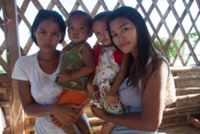Doesn’t work: Eduarte showing food supplements falsely promoted on social media as cures for cancer at her home in Montalban, Rizal. — AFP
Filipino single mother Mary Ann Eduarte delayed chemotherapy for her breast cancer for several years and instead took food supplements falsely promoted on social media as cures for the deadly disease.
They didn’t work and the cancer spread to her lungs and bones.





